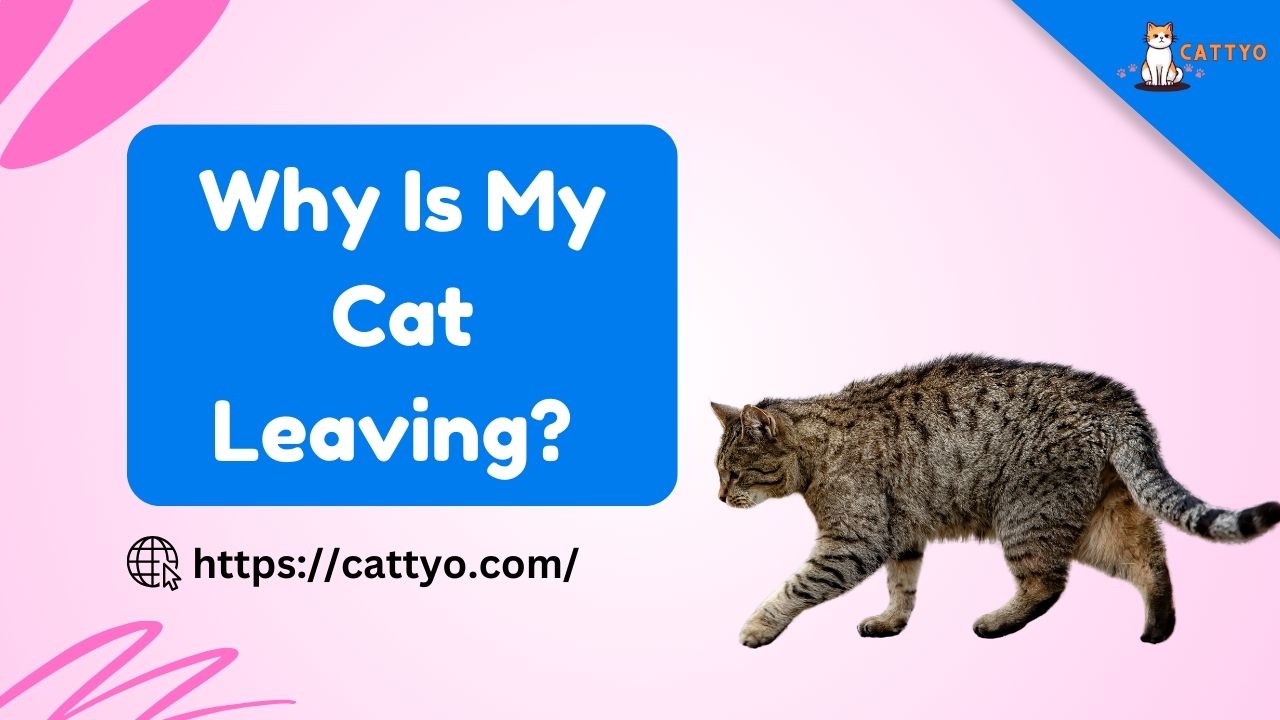If your cat is suddenly spending more time outdoors or away from home, it could be due to a variety of reasons—from natural instincts to changes in their environment or health. Understanding the signs can help you address their needs and bring your feline friend back to where they feel most comfortable.
Cats are known for their independence, but what happens when your cat suddenly starts distancing themselves from you? You might find yourself wondering, “Why is my cat leaving?”
If you’ve noticed that your cat is spending less time with you or wandering off more frequently, it’s natural to feel confused or even a bit hurt.
Is your cat upset with you? Are they unhappy with their environment? Or is something else going on?
In this article, we will explore the common reasons why cats leave or seem to distance themselves and provide insights on how to keep them comfortable, engaged, and emotionally satisfied in your home.
We’ll also look at various factors that can influence a cat’s behavior, and what you can do to keep the bond strong between you and your furry friend.
Why Is Your Cat Leaving?
First things first, it’s important to acknowledge that cats are naturally more solitary creatures than dogs. Unlike dogs that typically crave constant companionship, cats are often more self-sufficient and comfortable with their alone time.
So, if your cat is “leaving” or spending time away from you, it’s not necessarily a sign of discontent. Here are a few reasons why cats might seem distant:
1. Independence and Natural Instincts
Cats are inherently independent animals. Unlike dogs that have been bred to be pack animals, cats are solitary hunters by nature.
In the wild, they would spend much of their time hunting alone and seeking refuge in quiet spaces. Domestic cats retain much of this behavior, which is why they might prefer to retreat to a quiet corner of the house or go off on their own.
Key Takeaway:
Don’t take it personally when your cat retreats. It’s simply in their nature to value time alone.
2. Seeking Comfort and Quiet Spaces
Your cat may seek out different areas in the house to retreat to, especially if they’re looking for peace and quiet.
High vantage points, cozy corners, or even under furniture can all be ideal spots for your cat to feel safe and secure. If your cat has discovered a spot that gives them comfort, it could be a sign they just need some space to relax.
Key Takeaway:
Providing quiet spaces where your cat can hide or rest might help them feel more at ease and could reduce the desire to “leave.”
3. Health Issues or Pain
Sometimes, when a cat is in pain or not feeling well, they might isolate themselves. If a cat feels sick, they may not want to engage in their usual activities or spend time with you.
Changes in eating habits, grooming routines, or litter box behavior can all be indicators that your cat is feeling unwell.
Key Takeaway:
If your cat’s behavior has drastically changed, especially if they’re hiding more often or showing signs of discomfort, it’s a good idea to consult a veterinarian to rule out any health issues.
4. Stress and Environmental Changes
Cats are highly sensitive to changes in their environment. A new pet, moving to a new home, changes in routine, or even new people can cause stress and make a cat more likely to retreat.
Stress can also manifest as behavioral changes, such as excessive grooming, aggression, or, in some cases, running away or avoiding interaction.
Key Takeaway:
If there have been any recent changes in the household or daily routine, your cat might be distancing themselves due to stress. Creating a stable, predictable environment can help reduce this.
5. Boredom or Lack of Stimulation
Cats, especially indoor cats, may seek out opportunities to explore if they’re not getting enough mental and physical stimulation.
Without enough toys, playtime, or exploration opportunities, your cat may decide to venture outside or find places where they can entertain themselves. If they’re not being sufficiently stimulated, they may try to “escape” the monotony of indoor life.
Key Takeaway:
Increase your cat’s playtime, provide interactive toys, and consider setting up window perches or cat trees to keep them engaged.
6. Hormonal Changes and Age-Related Behavior
If your cat is unspayed or unneutered, they may experience strong mating urges, leading them to roam outside more frequently.
Similarly, older cats may exhibit changes in behavior as they age, becoming more reclusive or distant due to changes in their physical or mental health.
Key Takeaway:
If your cat has reached a certain age or is not spayed/neutered, consider discussing these issues with your vet.
How to Keep Your Cat Close and Happy
While some level of independence is normal for cats, it’s still important to nurture your relationship with your cat to keep them happy, healthy, and emotionally secure. Here are a few tips to help strengthen your bond:
1. Spend Quality Time Together
Even if your cat enjoys their independence, they still appreciate affection and bonding time. Make sure to set aside regular moments for play, petting, or simply sitting near them to show them they’re loved.
Pay attention to their body language; some cats enjoy petting, while others prefer just being in the same room with you.
2. Provide Enough Stimulation
Interactive toys, puzzle feeders, and climbing structures like cat trees are excellent ways to keep your cat mentally and physically stimulated. Cats need challenges and activities to stay engaged.
If your cat is an outdoor explorer, consider enriching their environment by adding windows with a good view, or by creating a “catio” (a cat patio) where they can enjoy the outdoors safely.
3. Create Safe, Quiet Spaces
Cats value their personal space. You can create more quiet, safe areas for them to relax, away from loud noises or stressful situations. This helps to make them feel secure and reduces the likelihood that they’ll seek solitude elsewhere.
4. Be Mindful of Stressors
Try to keep your cat’s environment as calm and predictable as possible. Sudden changes, such as moving furniture or introducing new pets or people, can stress out your cat.
If you’re moving to a new home or going through major life changes, try to ease your cat into the new situation gradually.
5. Maintain a Healthy Routine
Cats thrive on routine. Feed them at the same time each day, keep their litter box clean, and maintain consistent interaction times. Predictability helps your cat feel secure and reduces the chances of them feeling the need to retreat.
6. Regular Veterinary Checkups
If you suspect your cat is hiding due to health issues, it’s crucial to have them checked by a veterinarian. Regular health checkups ensure that any underlying health concerns are addressed before they worsen.
Frequently Asked Questions (FAQs)
Q: My cat is hiding more than usual. Is something wrong?
A: If your cat is hiding more often, it could be a sign of stress, illness, or a need for some alone time. It’s important to observe other signs like appetite loss or behavioral changes and consult a vet if you’re concerned.
Q: How can I tell if my cat is unhappy with me?
A: Cats show affection in different ways. If your cat is not seeking attention or affection, it doesn’t always mean they’re unhappy with you. They may just need space. Look for other signs such as changes in eating habits, grooming, or litter box behavior to determine if there’s an issue.
Q: How do I get my cat to stop leaving the house?
A: If your cat is leaving the house frequently, it could be due to boredom or mating urges. Keeping your cat indoors, providing enrichment, and getting them spayed/neutered are good steps to reduce the desire to roam.
Q: Why does my cat act distant when I have company?
A: Cats can be wary of strangers and may become distant or hide when unfamiliar people are around. It’s a natural defense mechanism. Allow your cat time to adjust to new people and provide them with a safe, quiet place to retreat.
Conclusion
Understanding why your cat is leaving or acting distant can be a mix of evaluating their natural instincts, emotional state, and overall health.
While some independence is normal, ensuring that your cat’s environment is comfortable, enriched, and stress-free will go a long way in maintaining a strong bond between you and your feline friend.






